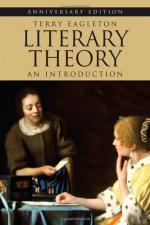
|
| Name: _________________________ | Period: ___________________ |
This quiz consists of 5 multiple choice and 5 short answer questions through Chapter 5, Psychoanalysis.
Multiple Choice Questions
1. According to Eagleton, why did the Russian formalists NOT see a literary work as a vehicle for ideas, reflection of reality, or transcendental truth?
(a) Because they saw language as obtuse, vague, and ephemeral.
(b) Because they saw language as potentially empowering the masses.
(c) Because they saw language as words and not objects or feelings.
(d) Because they saw language as a mode of speech for the wealthy.
2. According to Eagleton, "the tactic of _________criticism ... is to show how texts come to embarrass their own ruling systems of logic."
(a) Psychoanalytic.
(b) Post-structuralist.
(c) Deconstructive.
(d) Feminist.
3. According to Eagleton, what kind of age do we live in, where "meaning, like everything else, is expected to be instantly consumable"?
(a) Esoteric.
(b) Postmodern.
(c) Modern.
(d) Traditional.
4. What is the name of the critic from the Constance school of reception aesthetics and the author of "The Act of Reading" who Eagleton discusses at length?
(a) Roman Ingarden.
(b) Jean Paul Sartre.
(c) Wolfgang Iser.
(d) Roland Barthes.
5. According to Eagleton, who would an ideal reader be for a structuralist?
(a) Someone who had all the codes at her or his disposal.
(b) Someone who didn't have any codes at her or his disposal.
(c) Someone who had the right codes at her or his disposal.
(d) Someone who had intelligent codes at her or his disposal.
Short Answer Questions
1. The English philosopher J. L. Austin saw language as what?
2. How did post-structuralism respond to France's student movement's failed attempt to break state power?
3. Who wrote "What is Literature" on literary reception and was published in 1948?
4. According to Sigmund Freud, what distinguishes humans from other animals?
5. According to Eagleton, what does his book try to demonstrate about a body of literary theory?
|
This section contains 399 words (approx. 2 pages at 300 words per page) |

|




